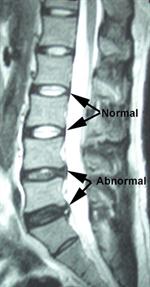All About An Abnormal Groton Lumbar Spine
The Most Common Causes of Cervical Spine Pain are Basically Two:
- a disc condition in which tearing of the elastic fibers of the interverterbral disc causes pain and sometimes allows swelling of the disc to compress a nerve, resulting in leg pain (sciatica).
- a non-disc condition due to articular facet joint irritation at the motion areas of one vertebra with another.
- thinning of the disc space (disc degeneration)
- misalignment of facet articulations (subluxation)
- narrowing of the spinal nerve opening (stenosis)
- compression of the spinal nerve root via the escape of the fluid of the nucleus pulposus' center (disc herniation / non-contained disc) that chemically or mechanically presses on the nerve
- compresssion of the spinal nerve root via the nucleus pulposus' center pushing the outer fibers (anulus fibrosis) into the spinal canal and onto a spinal nerve (disc herniation / contained disc)
- compression of the spinal nerve root that results in leg pain (sciatica)

Other conditions due to lumbar spine issues...
- Ankylosing spondylitis
- Arthritis
- Compression fracture
- Degenerative disc disease
- Disc herniation - contained
- Disc herniation-non-contained
- Facet syndrome
- Femoral nerve root pain
- GOIC syndrome
- Osteoporosis
- Persistent post-surgical pain syndrome
- Pregnancy-related back (and leg) pain
- Retrolisthesis
- Sciatica (leg pain)
- Scoliosis
- Short leg
- Spinal instability
- Spondylolisthesis
- Sprain/strain
- Stenosis
- Subluxation
- Synovial cyst
- Transitional segment
- Tropism
- Viscerosomatic disease
You must understand that it takes three months for a torn disc to heal well enough to allow you to return to daily activities like prolonged sitting, bending, lifting, twisting, etc. Now that doesn't mean that you will have pain for three months, but rather that it takes that time to heal whether you feel pain or not. The first three to four weeks of concentrated in-office treatment, therapies, and at-home care are designed to allow the best opportunity for your disc to heal quickly.
In the 1000 cases study of patients undergoing care for their back pain, 91% reported maximum improvement in 90 days of care and 70% of patients in less than 30 visits. (1)
In office, Shoreline Medical Services/ Hutter Chiropractic Office uses Cox Technic Flexion Distraction and Decompression to lower the pressure in the disc so the nucleus pulposus returns to the center of the disc, aid in the healing of the torn anular fibers, and drive out chemicals that irritate and inflame the spinal nerves.
At home you will want to avoid sitting for long periods of time, wear a support brace if recommended, take nutritional supplements that help rebuild disc cartilage, sleep on a supportive mattress, sit in an ergonomically designed chair, avoid constipation which just forces you to use pressure that your spine doesn't need, and modify your daily activities as needed.
Contact us for relief of your cervical spine pain.
- Cox, JM, Feller JA, Cox JA: Distraction Chiropractic Adjusting: Clinical Application, Treatment Algorithms, and Clinical Outcomes of 1000 Cases Studied. Topics in Clinical Chiropractic 1996; (3)3:45-59, 79-81
